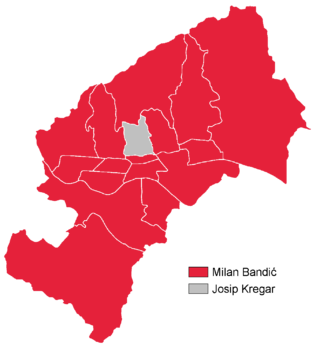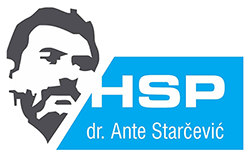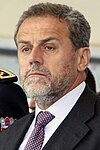
Parliamentary elections to elect all 151 members of the Croatian Parliament were held on 23 November 2003. They were the fifth parliamentary elections to take place since the first multi-party elections in 1990. Voter turnout was 61.7%. The result was a victory for the opposition Croatian Democratic Union (HDZ) which won a plurality of 66 seats, but fell short of the 76 needed to form a government. HDZ chairman Ivo Sanader was named the eighth Prime Minister of Croatia on 23 December 2003, after parliament passed a confidence motion in his government cabinet, with 88 MPs voting in favor, 29 against and 14 abstaining. The ruling coalition going into the elections, consisting of the Social Democratic Party (SDP), Croatian People's Party (HNS), Croatian Peasant Party (HSS), Party of Liberal Democrats (Libra) and the Liberal Party (LS), did not contest the elections as a single bloc; the SDP ran with the Istrian Democratic Assembly (IDS), the Party of Liberal Democrats (Libra) and the Liberal Party, HNS ran with the Alliance of Primorje-Gorski Kotar (PGS) and the Slavonia-Baranja Croatian Party (SBHS), while HSS ran on its own.

The Social Democratic Party of Croatia is a social-democratic political party in Croatia. The SDP is anti-fascist, progressive, and strongly pro-European. The SDP was formed in 1990 as the successor of the League of Communists of Croatia, the Croatian branch of the League of Communists of Yugoslavia, which had governed Croatia within the Socialist Federal Republic of Yugoslavia since World War II.

The Croatian People's Party – Liberal Democrats is a social-liberal political party in Croatia.
LIBRA - Party of Liberal Democrats was a short-lived Croatian social-liberal political party active between September 2002 and August 2005. During its existence the party ran in only one parliamentary election, in 2003, and won three seats in the 151-seat 5th Assembly of the Croatian Parliament.
Regular elections in Croatia are mandated by the Constitution and legislation enacted by Parliament. The presidency, Parliament, county prefects and assemblies, city and town mayors, and city and municipal councils are all elective offices. Since 1990, seven presidential elections have been held. During the same period, ten parliamentary elections were also held. In addition, there were nine nationwide local elections. Croatia has also held three elections to elect members of the European Parliament following its accession to the EU on 1 July 2013.
The Zagreb crisis is the political crisis that followed the elections for the City of Zagreb local assembly held in October 1995. During the crisis the winning parties were unable to appoint their candidate for the Mayor of Zagreb because President of Croatia Franjo Tuđman refused to provide the formal confirmation of their decision.

Parliamentary elections were held in Croatia on 25 November 2007 and for overseas voters on 24 and 25 November. The campaign officially started on 3 November. The President of Croatia announced elections on 17 October and 14 days were allowed for candidate lists to be submitted.
Vlasta Pavić is a Croatian lawyer and politician who served as Mayor of Zagreb from 2002 to 2005. She is the second woman to hold that office, and a member of the centre-left Social Democratic Party (SDP).
Elections were held on 15 May 2005 in Zagreb, the capital of Croatia. Following the last local elections in 2001, Milan Bandić of the Social Democratic Party of Croatia (SDP) had been re-elected as the mayor of Zagreb. In 2002, an incident made him resign in favor of Deputy Mayor Vlasta Pavić, also from the SDP. Pavić remained formally in control of the city until 2005. In the 2005 elections, she was moved down the list of candidates to the 16th place, while the list holder and SDP's candidate for mayor was Bandić.

On 17 May 2009, local elections were held in Zagreb, the capital of Croatia. The incumbent mayor was Milan Bandić, a representative of the Social Democratic Party of Croatia (SDP), also the leading party in the previous city council. Bandić was reelected mayor in the second round of the elections with 61.84% of the votes.

Parliamentary elections were held in Croatia on 8 November 2015. All 151 seats in the Parliament were up for election. This parliamentary election was the 8th since the first multi-party election in 1990 and the first since Croatia joined the European Union in 2013. The ruling center-left Croatia is Growing coalition, led by Prime Minister Zoran Milanović, was challenged by the center-right Patriotic Coalition led by the HDZ and headed by its party chairman Tomislav Karamarko, and also faced several new political coalitions.

Croatian Party of Rights Dr. Ante Starčević was a nationalist political party in Croatia.
The Bridge, previously known as Bridge of Independent Lists until November 2020, is a political party in Croatia founded in 2012. The party is led by Božo Petrov, its founder and the former mayor of Metković, deputy prime minister and speaker of the Croatian Parliament. Although the party leaders initially avoided ideological topics, The Bridge underwent a rebranding prior to the 2020 Croatian parliamentary election, establishing itself as a social conservative and soft Eurosceptic party.

Parliamentary elections were held in Croatia on 5 July 2020. They were the tenth parliamentary elections since the first multi-party elections in 1990 and elected the 151 members of the Croatian Parliament. 140 Members of Parliament were elected from geographical electoral districts in Croatia, three MPs were chosen by the Croatian diaspora and eight MPs came from the ranks of citizens registered as belonging to any of the 22 constitutionally recognized national minorities.

The 1993 local elections in Zagreb were held on 7 February 1993. These were the first local elections since Croatia gained independence. The Croatian Democratic Union (HDZ) won a majority in the Zagreb Assembly with 35 seats out of 60 and Branko Mikša became the new Mayor of Zagreb.
Elections were held in Zagreb on 13 April 1997 for members of the Zagreb Assembly. The Croatian Democratic Union (HDZ) won a majority in the City Assembly with 24 seats out of 50. Marina Matulović-Dropulić was named the new Mayor of Zagreb.
Elections were held in Zagreb on 21 May 2001 for members of the Zagreb Assembly. Milan Bandić, the incumbent mayor since 2000, led the list of the Social Democratic Party of Croatia (SDP), the largest centre-left party in the country and at the time a member of the governing coalition of Croatia.

Jelena Pavičić Vukičević is a Croatian politician who served as president of the Bandić Milan 365 - Labour and Solidarity Party. She assumed the position following the death of the previous party president, Milan Bandić, on 28 February 2021. Pavičić Vukičević also assumed Bandić's role of the mayor of Zagreb, which she served until the 4 June 2021, following her loss at the 2021 Zagreb mayoral elections.

Elections were held in Zagreb on 16 May 2021 for the 53rd mayor of Zagreb, the two deputy mayors, the 47 members of the Zagreb Assembly, the councils of districts and the local committees, as part of the 2021 Croatian local elections. The runoff for the mayor took place on 30 May 2021.















